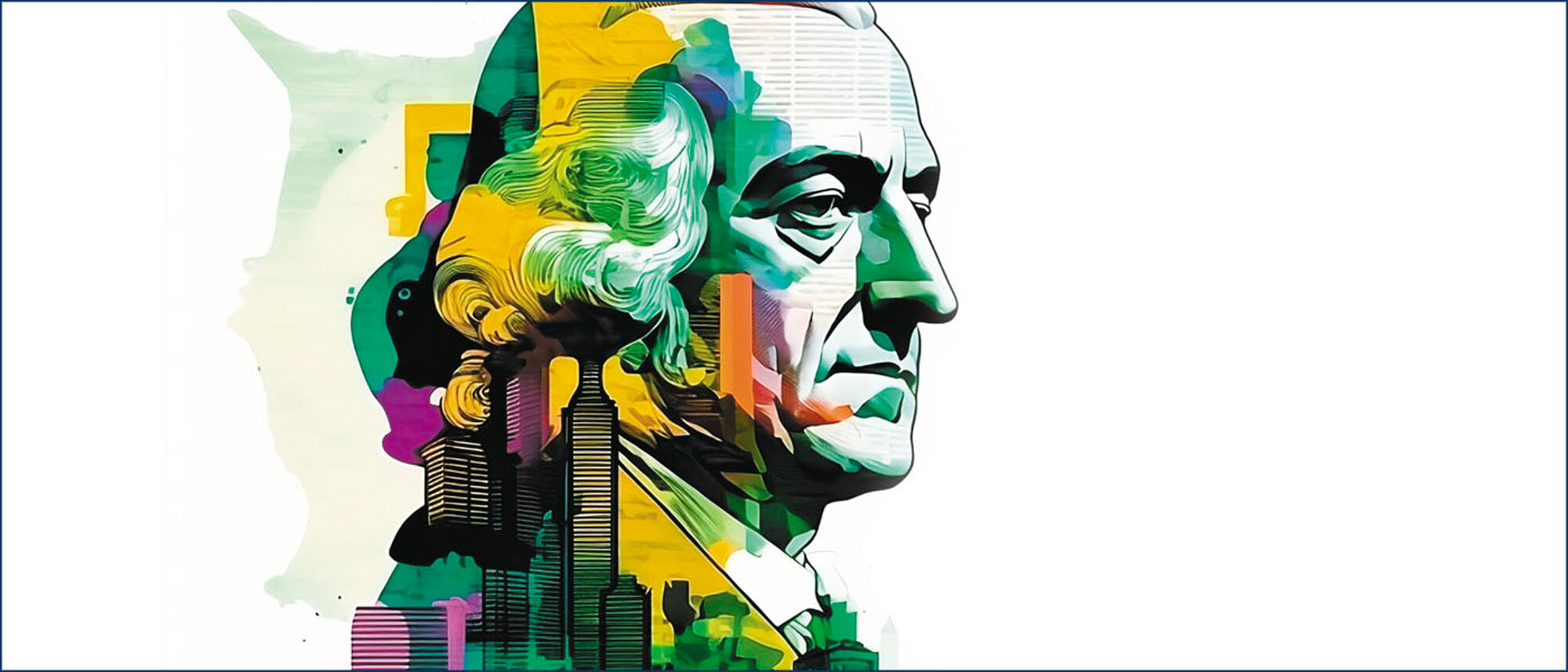
A summer of Adam Smith
By Michelle Kilfoyle
Many people think they know Adam Smith, and take many of his concepts, such as the division of labour and the invisible hand, for granted. But who was he really? From 5–10 June 2023, marking the 300th anniversary of his birth, a global community of over 1,500 economists, political scientists, students and members of the public came together at the University for a series of talks, workshops, debates and artistic performances to commemorate Smith’s life and revisit his evergreen ideas.
Tercentenary Week was a chance to discover and discuss who Smith really was, as an educator, citizen and scholar – the Kirkcaldy man, forever linked with the University of Glasgow, whose ideas changed the world. The week’s events were the chance to see Smith in a new light.
Trio of talks go to the heart of Adam Smith
“It’s almost impossible to talk about economics without invoking Adam Smith,” remarked Gita Gopinath of the International Monetary Fund in her keynote lecture, which focused on artificial intelligence. “Like the Industrial Revolution, the dawn of which Smith witnessed in his lifetime,” she said, “AI could change our lives spectacularly. Smith would have been impressed by the emergence of such a powerful technology in a globalised economy,” she remarked, but he might also have realised that “the invisible hand alone may not be enough to ensure broad benefits to society.”

Gita Gopinath (R) in the Bute Hall with broadcaster Kirsty Wark, after their Adam Smith-themed 'fireside chat'.
In her packed lecture, Professor Deirdre McCloskey of the University of Illinois called Smith a “radical egalitarian,” who held a deep conviction that markets must work for everyone, especially the poor, and that mercantilism did not. For Professor McCloskey, Smith’s greatest legacy as “the first true liberal” is “equality of permission.” She credited this liberty of permission as key to the remarkable rise in average global income, from $2 a day in Smith’s time to $50 today, correcting for inflation. “Smith didn't know that his great idea of equality permission was going to lead to the enrichment of every person in this room compared to their ancestors,” she told her audience.
"Take down that dusty copy of The Wealth of Nations that has been sitting on your shelf since you were an undergraduate … read it ... you’ll enjoy reading it.” Professor of the History of Political Thought and co-organiser of Tercentenary Week, Craig Smith
And Nobel Prize-winning economist Sir Angus Deaton drew a line in his lecture from the Chicago School of Economics’ misrepresentation of Smith’s free-market ideas in the 1950s, to the drop in quality of life seen in American society today, for the 60% of the population without a college education. Unlike in other rich countries, life expectancies have fallen for this group. “Whatever plague is afflicting the US, a bachelor's degree pretty much brings you immunity,” summed up Deaton. One important driver of this ‘plague’, he said, is the free-market principles that have allowed, among other things, large pharmaceutical organisations to influence government at the expense of public wellbeing. For Sir Angus Deaton, Smith has much to teach modern-day economists about their purpose.
As well as these talks, the week also featured a student-led conference, Adam Smith: Re-Enlightened, a day-long symposium, a climate challenge competition, as well as theatre and musical interludes; on the final day of Tercentenary Week, the Hallelujah String Trio treated participants to 'A Symphony of Moral Sentiments', composed by alumna Helen McKinnon (BMus 2002). "This is the first time I've written a piece that has been inspired especially by the life of a particular person," she says. Helen explored the theme of how we inherit the past to give to the future in her work, which you can listen to below.
This article was first published September 2023.
REIMAGINING ADAM SMITH

As part of the Adam Smith 300 commemorations, students across the UK entered a competition to give Smith's books a new, fresh cover design. This one above is by UofG Philosophy & History of Art student Lucille Ling. Take a look at some more of the winning entries.
Main image (top) by Joshua O'Connor.

Smith’s legacy to the world
From fishing village to fame and fortune – what did Adam Smith leave behind to inspire us?

Adam Smith Summer School launches
International students spent three weeks on campus immersing themselves in all things Adam Smith.

